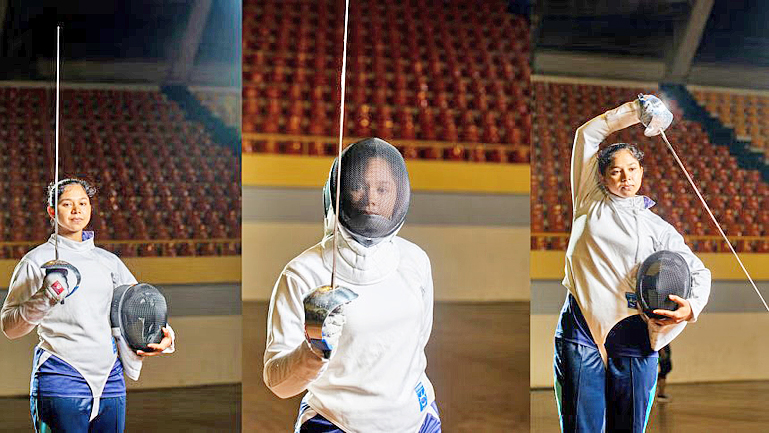ANN/THE DAILY STAR – Fatema Mujib is a shining example of what tenacity and natural skill can accomplish in the busy lanes of Dhaka, Bangladesh where life often swings between the dreams of dreamers and the harshness of reality.
Her innocent-looking eyes and gentle attitude may easily make one believe that she is as harmless as a lamb, but when Fatema holds a sabre, she turns into a lioness, furious and uncompromising in the fencing ring.
Fatema was not born with a silver spoon, nor did she grow up with the luxury of world-class facilities or any amenities at all. She is from Dhaka, which many are all too familiar with: congested streets, lengthy journeys, and the continual push to make ends meet. Saddam, her brother and a fencer, used to drive her to training sessions on his bicycle, navigating the city’s congested traffic, horns and rickshaws creating a cacophony around them. The sport that today honours her as a gold medallist began for her on these difficult streets. “We couldn’t even afford to buy another fencing uniform. I trained in my brother’s uniform,” she admitted modestly. Fatema stands out as an encouraging exception in Dhaka, where cultural conventions frequently require women to emphasise family above personal ambition.
She is not just a fencer, but also a dedicated mother to her eight-year-old daughter.
Fatema’s narrative challenges the social constructs of what a woman ‘should be able to do’.
Under the guidance of Joseph Maluleke, Bangladesh’s National Sabre Coach, Fatema found more than just expert training. She found a mentor who recognised her commitment.
“Fatema loves the sport; her dedication and her ever-joyful nature speak volumes. Even when the training time is up, she yearns to push further,” Maluleke observed, highlighting her indefatigable spirit.
The 13th South Asian Games was a turning point, not just for Fatema, but for the countless young women in Bangladesh she inspired. When she secured the first gold medal for Bangladesh in women’s sabre individual, the nation collectively came to know for the first time that it has fencers with the calibre of beating opponents with far more advanced equipment. With Fatema’s homecoming, Bangladesh acknowledged that a new icon had risen.
In a country where female athletes still grapple with societal prejudices, Fatema has incited a silent revolution. Suddenly, fencing is not just a sport; it’s a promise of liberation for young women. For many, she has become the face of what is possible when dedication meets opportunity, especially in a city like Dhaka, where struggle and survival are part of everyday life. As Fatema gears up for the upcoming Asian Games, she echoes the sentiments of a nation in need of heroes. “We are a nation of gifted people, there are many more like me waiting to prove themselves,” she passionately declared.
Fatema Mujib is a living testament to the resilience and dreams that fuel Dhaka’s beating heart. Her story is not just about a sportswoman achieving her dreams; it is a narrative of hope, a lesson that, with enough perseverance, the narrow lanes of Dhaka can lead to the world’s grandest arenas.
Through her struggle and triumph, Fatema doesn’t just score points in a match; she scores a victory for every dreamer, telling them that dreams, no matter how big, can come true. – K Tanzeel Zaman







